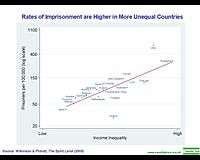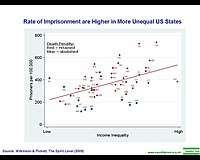Imprisonment
Imprisonment (from imprison, via French emprisonner, originally from Latin prensio, arrest, from prehendere, prendere, "to seize") in law is the specific state of being physically incarcerated or confined in an institutional setting such as a prison.[2] Courts of the United States, including the U.S. Supreme Court, have recognized that the minimum period in an indeterminate sentence that was actually imposed by a court of law is the official term of imprisonment.[3][4] In other words, any "street time" (i.e., probation, parole, or supervised release) that was ordered by the court as part of the defendant's punishment does not constitute term of imprisonment.[5]
| Criminal procedure |
|---|
| Criminal trials and convictions |
| Rights of the accused |
| Verdict |
|
| Sentencing |
|
| Post-sentencing |
|
| Related areas of law |
|
| Portals |
|
|



Imprisonment in other contexts is the restraint of a person's liberty, for any cause whatsoever, whether by authority of the government, or by a person acting without such authority. The latter case constitutes "false imprisonment". Imprisonment does not necessarily imply a place of confinement but may be exercised by any use or display of force, lawfully or unlawfully. People become prisoners, wherever they may be, by the mere word or touch of a duly authorized officer directed to that end.[6]
Sometimes gender imbalances occur in imprisonment rates, with incarceration of males proportionately more likely than incarceration of females. Ethnic minorities can also contribute disproportionate numbers to prison populations.[7]
History
England and Wales
Criminals and army soldiers have been imprisoned throughout history. In English law, imprisonment is the restraint of a person's liberty.[8] The 17th century book Termes de la Ley contains the following definition:
Imprisonment is no other thing than the restraint of a man's liberty, whether it be in the open field, or in the stocks, or in the cage in the streets or in a man's own house, as well as in the common gaols; and in all the places the party so restrained is said to be a prisoner so long as he hath not his liberty freely to go at all times to all places whither he will without bail or mainprise or otherwise.[9]
This passage was approved by Atkin and Duke LJJ in Meering v Grahame White Aviation Co.[10] It is not imprisonment to prevent a person from proceeding along a particular way if it is possible for him to reach his intended destination by another route.[11] Imprisonment without lawful cause is a tort called false imprisonment.[12]
United States
In the law of the United States, imprisonment does not include the period of probation, parole, or supervised release.[5] For purposes of the Immigration and Nationality Act (INA), every "reference to a term of imprisonment or a sentence ... is deemed to include the period of incarceration or confinement ordered by a court of law regardless of any suspension of the imposition or execution of that imprisonment or sentence in whole or in part."[13] This makes the word "sentence" and the phrase "term of imprisonment" synonymous.
Some legal experts have claimed that when a court modifies the original sentence due to probation violation, the resulting sentence counts for INA purposes.[14] But this premise conflicts with the plain language of the U.S. Congress, which had long stated that "the maximum penalty possible for the crime ... did not exceed imprisonment for one year and, if the alien was convicted of such crime, the alien was not sentenced to a term of imprisonment in excess of 6 months (regardless of the extent to which the sentence was ultimately executed)."[15]
The aforementioned phrase "maximum penalty possible for the crime" generally refers to the lower portion of every sentence that was imposed under the guidelines.[3][4] For example, if a person is convicted of a Pennsylvania misdemeanor and sentenced to 4 to 23 months of imprisonment,[16][5] he or she has actually been sentenced to only 4 months of imprisonment for INA purposes.[16] And if such person's minimum sentence was within the "standard range" of 0-111⁄2 months then his or her offense is obviously not punishable by one year or more of imprisonment.[17][16][3][4] Everything to the contrary leads to absurdity and deprivation of rights under color of law.[5][18][19] It is also important to note that for deportation purposes, a criminal alien must be rearrested and taken into custody of the U.S. Immigration and Customs Enforcement after his or her term of imprisonment has been completed.[20]
See also
References
This page in most part is based on law of the United States, including statutory and latest published case law.
- Turtola (2000), p. 403.
- See for example ; United States v. Pray, 373 F.3d 358, 361 (3d Cir. 2004) ("In ordinary usage, 'imprisonment' generally means physical confinement."); Commonwealth v. Conahan, 589 A.2d 1107, 1110 (Pa. 1991) ("Conahan voluntarily committed himself to inpatient custodial alcohol rehabilitation, which he successfully completed after devoting ninety-five continuous days towards overcoming his disease. We find that his successful completion of this custodial inpatient rehabilitation, which took place in three hospitals, falls within the common meaning of 'imprisonment'.")
- United States v. Valencia-Mendoza, 912 F.3d 1215, 1223-24 & n.4 (9th Cir. 2019); see also Shaya v. Holder, 586 F.3d 401 (6th Cir. 2009) ("[W]hen using Michigan indeterminate sentences as the predicate for classifying someone as an 'aggravated felon', the term must be measured by the sentence actually served or the minimum sentence given, whichever is greater, as this better incorporates the judge's discretion and determinations than the statutory maximum term.").
- "Removal Defense Implications of United States v. Valencia-Mendoza, 912 F.3d 1215 (9th Cir. 2019)" (PDF). Washington Defender Association. February 13, 2019. Retrieved 2019-06-04.
- United States v. Parsons, No. 15-2055, at p.10 (3d Cir. Nov. 10, 2016) (unpublished); United States v. Rodriguez-Bernal, 783 F.3d 1002, 1006 (5th Cir. 2015); United States v. Pettus, 303 F.3d 480 (2d Cir. 2002) (regarding "street time"); Young v. Pa. Board of Probation and Parole, No. 361 C.D. 2016 (Commonwealth Court of Pa. June 12, 2018) (regarding "street time"); United States v. Pray, 373 F.3d 358, 361 (3d Cir. 2004) ("We hold that the term 'imprisonment' ... does not include parole.... A person who is on parole, although subject to some restraints on liberty, is not 'imprisoned' in the sense in which the term is usually used. For example, if a parolee were informed at the end of a parole revocation hearing that the outcome was 'imprisonment,' the parolee would not think that this meant that he was going to be returned to parole.") (citations omitted); Young v. Pa. Board of Probation and Parole, 409 A.2d 843, 846-47 (Pa. 1979) ("To attempt to equate a parole status with that of custody is to ignore reality."); accord Morrissey v. Brewer, 408 U.S. 471, 482 (1972).
- "Imprisonment". The New International Encyclopedia. Second Edition. Dodd, Mead and Company. New York. 1915. Volume XII. Page 35.
-
In England and Wales, for example:
Flynn, Nick (1998). Introduction to Prisons and Imprisonment. Introductory Series. Winchester: Waterside Press. p. 79. ISBN 9781872870373. Retrieved 19 August 2019.
Black people are eight times more likely to be in prison than whites. Home Office figures show that the incarceration rate for black people is 1,162 per 100,000, compared to 146 per 100,000 for whites.
- Archbold Criminal Pleading, Evidence and Practice. 1999. Chapter 5. Section II. "Sentences of Imprisonment".
- John Rastell. Termes de la Ley. 1636. Page 202. Digital copy from Google Books.
- Meering v Grahame White Aviation Co (1919) 122 LT 44, [1918-19] All ER Rep 1490 at 1502 and 1503 and 1507. (The passages in question are set out in R v Sayle, 29 September 2008, Court of General Gaol Delivery, Isle of Man.
- Bird v Jones (1845) 7 QB 742, (1845) 115 ER 668, (1845) 15 LJQB 82, (1845) 9 Jur 870, (1845) 10 JP 4, (1845) 5 LT (OS) 406
- Clerk and Lindsell on Torts. Sweet and Maxwell. Sixteenth Edition. 1989. Paragraph 17-15 at page 972.
- ; Matter of Cota, 23 I&N Dec. 849, 852 (BIA 2005) ("[W]e see nothing in the language or stated purpose of section 101(a)(48)(B) that would authorize us to equate a sentence that has been modified or vacated by a court ab initio with one that has merely been suspended.").
- See, e.g., Matter of Ramirez, 25 I&N Dec. 203-06 (BIA 2010); Ahmed v. Att'y Gen., 212 Fed. Appx. 133, 135 (3d Cir. 2007) (unpublished); see also United States v. Benz, 282 U.S. 304, 306-07 (1931) ("The general rule is that judgments, decrees and orders are within the control of the court during the term at which they were made. They are then deemed to be 'in the breast of the court' making them, and subject to be amended, modified, or vacated by that court.").
- (emphasis added); see also ("Any alien who—(I) is convicted of a crime involving moral turpitude committed within five years ... after the date of admission, and (II) is convicted of a crime for which a sentence of one year or longer may be imposed, is deportable."); United States v. Bustillos-Pena, 612 F.3d 863 (5th Cir. 2010).
- Popal v. Gonzales, 416 F.3d 249 (3d Cir. 2005) ("[Petitioner] was sentenced to four to twenty-three months' imprisonment."); 42 Pa. Cons. Stat. § 9756(b) ("The court shall impose a minimum sentence of confinement which shall not exceed one-half of the maximum sentence imposed.") (emphasis added); Dessouki v. Att'y Gen., 915 F.3d 964, 966 (3d Cir. 2019) ("[T]he word 'shall' imposes a mandatory requirement."); Orozco-Velasquez v. Att'y Gen., 817 F.3d 78, 83 n.27 (3d Cir. 2016) (same); Kingdomware Technologies, Inc. v. United States, 579 U.S. ___, ___, 136 S.Ct. 1969, 1977 (2016) (same); Alabama v. Bozeman, 533 U.S. 146, 153 (2001) (same).
- See, e.g., ("The term 'crime punishable by imprisonment for a term exceeding one year' does not include . . . any State offense classified by the laws of the State as a misdemeanor and punishable by a term of imprisonment of two years or less.").
- "Deprivation Of Rights Under Color Of Law". U.S. Department of Justice (DOJ). August 6, 2015. Retrieved 2019-01-15.
Section 242 of Title 18 makes it a crime for a person acting under color of any law to willfully deprive a person of a right or privilege protected by the Constitution or laws of the United States. For the purpose of Section 242, acts under 'color of law' include acts not only done by federal, state, or local officials within their lawful authority, but also acts done beyond the bounds of that official's lawful authority, if the acts are done while the official is purporting to or pretending to act in the performance of his/her official duties. Persons acting under color of law within the meaning of this statute include police officers, prisons guards and other law enforcement officials, as well as judges, care providers in public health facilities, and others who are acting as public officials. It is not necessary that the crime be motivated by animus toward the race, color, religion, sex, handicap, familial status or national origin of the victim. The offense is punishable by a range of imprisonment up to a life term, or the death penalty, depending upon the circumstances of the crime, and the resulting injury, if any.
(emphasis added). - 18 U.S.C. §§ 241–249; United States v. Lanier, 520 U.S. 259, 264 (1997) ("Section 242 is a Reconstruction Era civil rights statute making it criminal to act (1) 'willfully' and (2) under color of law (3) to deprive a person of rights protected by the Constitution or laws of the United States."); United States v. Acosta, 470 F.3d 132, 136 (2d Cir. 2006) (holding that 18 U.S.C. §§ 241 and 242 are "crimes of violence"); see also 42 U.S.C. §§ 1981–1985; et seq.; Rodriguez v. Swartz, 899 F.3d 719 (9th Cir. 2018) ("A U.S. Border Patrol agent standing on American soil shot and killed a teenage Mexican citizen who was walking down a street in Mexico."); Ziglar v. Abbasi, 582 U.S. ___ (2017) (mistreating immigration detainees); Hope v. Pelzer, 536 U.S. 730, 736-37 (2002) (mistreating prisoners).
- See, e.g., ; see also ("[T]the Attorney General may not remove an alien who is sentenced to imprisonment until the alien is released from imprisonment.").
External links
